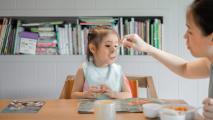Field: Family
Beyond screen time: Rethinking kids’ tech use with the “Goldilocks hypothesis”
The "Goldilocks hypothesis" asks parents to think beyond screen time and consider the habits that teens build around technology use.
Oxytocin’s effects aren’t just about love
At last, neuroscientists are learning how the hormone shapes social behaviors such as pair-bonding and parental care. It’s more complicated than they thought.
Study: one in five workers would sacrifice 16% to 33% of salary to work from home
Would you give up some of your pay check to be able to work from home? People value working from home more than you'd think.
Cappella’s AI translates baby cries to help sleep-deprived parents
The startup Cappella has developed an app that translates baby cries and informs parents what is wrong alongside helpful suggestions.
Untangling the genetics that underlie our facial features
Hundreds, if not thousands, of genes affect the shape of the face, in subtle ways. Researchers explain why, and how, we look like our family.
How language and social status change the developing brain
Research shows that a child's early environment and socioeconomic status (SES) impact their language development and processing skills.
“5 stages of grief” is a myth — and knowing that helps us better cope with loss
The “monomyth” model of grieving offers closure and recovery, but in most traditional cultures the dead never leave the living.
How building more backyard homes, granny flats, and in-law suites can help alleviate the housing crisis
Accessory dwelling units, or ADUs, are sometimes called “granny flats,” “backyard homes,” “in-law suites,” or “backyard cottages.”
The radical drop in maternal mortality was a public health miracle
In 1758 in Sweden, 1205 mothers died for every 100,000 live births, which was likely representative of the global maternal mortality rate.
We’re analysing DNA from ancient and modern humans to create a “family tree of everyone”
Genetic genealogy not only helps us understand where we came from, but it could also be used for tracing the origin of genetic mutations.
Study: Parenthood seems to rewire gray matter
A study found that couples who co-parent together display similar brain activity, suggesting they become greatly attuned to each other.
More Americans than ever have no friends. Here are 5 steps to make more friends.
The last decade has seen a steep drop in adult friendships and a worrying increase in loneliness. Is this the cost of our modern life?
40% of chores could be done by robots within 10 years, according to a new study
Nearly 40% of the time spent on domestic chores could be automated within a decade, researchers estimate.
“Personalized curriculums” could get kids to care about school again
Personalized learning has to potential to prepare learners who are self-regulating and self-motivated for life beyond school.
Parents: Don’t focus on happiness, help build resilience instead
Happiness emerges from resilience, which helps children regulate difficult emotions and stressful situations.
How neuroscience can make us better parents
Kids' brains develop in four main stages. Each has its own particular set of advancements and challenges for parents.
Identical twins were raised in different countries. Here’s how they differ today.
After being separated as toddlers, two identical twins were raised apart in the US and South Korea.
Nurturing dads raise emotionally intelligent kids
Nurturing dads raise more emotionally intelligent children, helping make society more respectful and equitable.
Study reveals the dynamics of human milk production
MIT researchers performed a large-scale study of the cells in human breast milk, allowing them to track how these cells change over time.
Why employers might pay your parents to watch your kids
The Helpr app makes it easy for working parents to get their employers to pay for backup childcare provided by friends and family members.
Minnesota stops separating newborns and incarcerated mothers
The Healthy Start Act makes Minnesota the first state to stop the practice of separating incarcerated mothers from their newborns soon after delivery.
Series|
Catalysts
How to keep kids out of the foster care system
In partnership with Stand Together
The foster care system has become a catch-all for all forms of family crises, but what if there was a resource parents could access for support before government intervention even became necessary?
This gang is breaking the stereotype of the absent black father
These dads are on a mission to change the way the world views black parenthood.
Domestic abuse is surging under lockdown. can we stem the tide?
Coronavirus lockdowns may be the impetus for rising occurrences of child and domestic abuse. Advocates find creative solutions.























